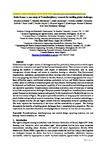Bottle house: A case study of transdisciplinary research for tackling global challenges
| dc.contributor.author | Oyinlola, M | |
| dc.contributor.author | Whiteheadb, T | |
| dc.contributor.author | Abuzeinabc, A | |
| dc.contributor.author | Adefilad, A | |
| dc.contributor.author | Akinola, Y | |
| dc.contributor.author | Anafi, F | |
| dc.contributor.author | Farukh, F | |
| dc.contributor.author | Jegede, O | |
| dc.contributor.author | Kandan, K | |
| dc.contributor.author | Kim, Boksun | |
| dc.contributor.author | Mosugu, E | |
| dc.date.accessioned | 2018-07-30T10:04:28Z | |
| dc.date.issued | 2018-09 | |
| dc.identifier.issn | 0197-3975 | |
| dc.identifier.issn | 1873-5428 | |
| dc.identifier.uri | http://hdl.handle.net/10026.1/11944 | |
| dc.description.abstract |
Globalisation has brought a number of challenges to the fore, particularly those problems which require collaboration, innovation and capability development between nations. There are some complex issues piquing the attention of researchers with respect to sustainable development, such as, waste management, climate change, and access to amenities, housing or education. Non-Governmental Organisations, Institutions, governments and others working in the field of international development have been grappling with these difficulties for decades. However, it is becoming apparent that many of these difficulties require multifaceted solutions, particularly in Low and Middle Income countries (LMIC) where it is difficult to consolidate gains and fund schemes. Development work can sometimes be disjointed and inefficient, impairing the capability of local communities and inhibiting sustainable and innovative approaches. Transdisciplinary collaboration is reliably a more efficient way of tackling some of the most pertinacious challenges. This paper presents findings from a transdisciplinary research project focussed on developing resources and capacity for the construction of affordable homes in a low income community in Nigeria. The project explored the suitability of using upcycled materials such as plastic bottles and agricultural waste in construction. Using a user-centred, co-creation methodology, a team of experts from the UK and Nigeria worked with local entrepreneurs to build a prototype home. The study explores the functionality of the home and the sustainability of project. The findings demonstrate the benefits of tackling global challenges from a transdisciplinary perspective. This has implications for researchers focused on developing technical solutions for low-income communities. | |
| dc.format.extent | 18-29 | |
| dc.language | en | |
| dc.language.iso | en | |
| dc.publisher | Elsevier | |
| dc.subject | Transdisciplinary | |
| dc.subject | Interdisciplinary | |
| dc.subject | User centred design | |
| dc.subject | Upcycling materials | |
| dc.subject | Low cost housing | |
| dc.subject | Circular economy | |
| dc.subject | Co - creation | |
| dc.title | Bottle house: A case study of transdisciplinary research for tackling global challenges | |
| dc.type | journal-article | |
| dc.type | Journal Article | |
| plymouth.author-url | https://www.webofscience.com/api/gateway?GWVersion=2&SrcApp=PARTNER_APP&SrcAuth=LinksAMR&KeyUT=WOS:000443670300003&DestLinkType=FullRecord&DestApp=ALL_WOS&UsrCustomerID=11bb513d99f797142bcfeffcc58ea008 | |
| plymouth.volume | 79 | |
| plymouth.publication-status | Published | |
| plymouth.journal | Habitat International | |
| dc.identifier.doi | 10.1016/j.habitatint.2018.07.007 | |
| plymouth.organisational-group | /Plymouth | |
| plymouth.organisational-group | /Plymouth/Faculty of Science and Engineering | |
| plymouth.organisational-group | /Plymouth/Faculty of Science and Engineering/School of Engineering, Computing and Mathematics | |
| plymouth.organisational-group | /Plymouth/REF 2021 Researchers by UoA | |
| plymouth.organisational-group | /Plymouth/REF 2021 Researchers by UoA/UoA12 Engineering | |
| plymouth.organisational-group | /Plymouth/Users by role | |
| plymouth.organisational-group | /Plymouth/Users by role/Academics | |
| dcterms.dateAccepted | 2018-07-23 | |
| dc.rights.embargodate | 2020-7-27 | |
| dc.identifier.eissn | 1873-5428 | |
| dc.rights.embargoperiod | Not known | |
| rioxxterms.versionofrecord | 10.1016/j.habitatint.2018.07.007 | |
| rioxxterms.licenseref.uri | http://www.rioxx.net/licenses/all-rights-reserved | |
| rioxxterms.licenseref.startdate | 2018-09 | |
| rioxxterms.type | Journal Article/Review |


